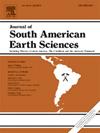墨西哥索诺拉中部阿瓜维德山脉奥陶纪和泥盆纪微地貌:西劳伦西亚努亚省的一个新地点
IF 1.7
4区 地球科学
Q3 GEOSCIENCES, MULTIDISCIPLINARY
引用次数: 0
摘要
本文章由计算机程序翻译,如有差异,请以英文原文为准。
Ordovician and Devonian microfacies of Sierra Agua Verde, central Sonora, Mexico: A new locality of the Nuia Province from Western Laurentia
The Lower Ordovician carbonate rocks exposed in the Tuntunudé hill north of the Sierra Agua Verde, northeast of the town of Mátape, in central Sonora, consists of intraformational breccia, conglomeratic limestone, sandy limestone and limestone, which are overlain by a mixed succession of quartz sandstone and dolomitic sandstone. This succession is in turn unconformably overlain by an Upper Devonian sequence of dolomitic limestone, marl, conglomeratic limestone and sandy dolomite. The Lower Ordovician rocks contain abundant bioclasts of gastropods, brachiopods, trilobites, echinoderms, and sponges. Their microfacies show a marine medium to low energy environment, with sedimentation dominated by distal tempestites in laminar stages and intraclast debris formation during deposition. The depositional paleoenvironment corresponds to a marine middle-to-outer ramp. These strata are characterized by conodonts belonging to the Oepikodus communis and Reutterodus andinus biozones, as well as cyanobacteria incertae sedis Nuia sibirica. Devonian rocks overlying the Ordovician strata contain bioturbation and abundant bioclasts of echinoderms, brachiopods, bryozoans, gastropods, chaetetiform sponges, stromatoporoids; and also, colonial corals like Hexagonaria attenuata, Phillipsastrea hennahii and Phillipsastrea jachowiczi, monothalamous foraminifera like Vicinesphaera sp., monoserials such as Tikhinella measpis and planispiral such as Nanicella gallowayi. The microfacies show a high-energy environment in marine tropical shallow open-sea lagoonal waters, with ooids and reef building organisms.
求助全文
通过发布文献求助,成功后即可免费获取论文全文。
去求助
来源期刊

Journal of South American Earth Sciences
地学-地球科学综合
CiteScore
3.70
自引率
22.20%
发文量
364
审稿时长
6-12 weeks
期刊介绍:
Papers must have a regional appeal and should present work of more than local significance. Research papers dealing with the regional geology of South American cratons and mobile belts, within the following research fields:
-Economic geology, metallogenesis and hydrocarbon genesis and reservoirs.
-Geophysics, geochemistry, volcanology, igneous and metamorphic petrology.
-Tectonics, neo- and seismotectonics and geodynamic modeling.
-Geomorphology, geological hazards, environmental geology, climate change in America and Antarctica, and soil research.
-Stratigraphy, sedimentology, structure and basin evolution.
-Paleontology, paleoecology, paleoclimatology and Quaternary geology.
New developments in already established regional projects and new initiatives dealing with the geology of the continent will be summarized and presented on a regular basis. Short notes, discussions, book reviews and conference and workshop reports will also be included when relevant.
 求助内容:
求助内容: 应助结果提醒方式:
应助结果提醒方式:


